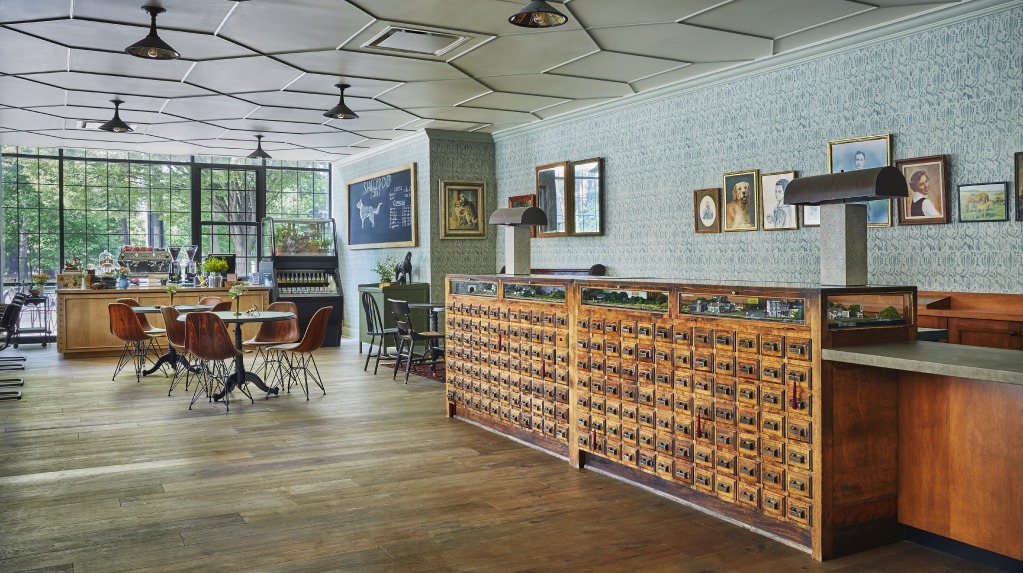You have /5 articles left.
Sign up for a free account or log in.
Art on the walls of a relatively new boutique hotel near the University of Wisconsin at Madison doesn’t just depict some flamingos hanging around some ducks. That is what the painting shows, yes, but it’s also a nod to the history of student government at the university.
Specifically, that painting (and a bunch of other flamingo-inflected art) alludes to the morning of Sept. 4, 1979, when students were greeted on campus by 1,008 plastic flamingos covering the hill in front of the dean’s office. A celebratory gesture by the recently re-elected and “admittedly absurdist” student Pail & Shovel party, which had campaigned on a platform that included flooding the football stadium for mock naval battles, converting the college’s budget to pennies to be dumped on the lawn for students to retrieve in pails and a promise to “buy the Statue of Liberty and move it to Wisconsin.”
The hotel with all the flamingos is called the Graduate Madison, and its chain, Graduate Hotels, just turned two years old. It has five locations up and running so far in cities like Oxford, Miss., and Tempe, Ariz., and another five upcoming this year. All the cities have a number of elements in common, but first and foremost is a major university presence.
Graduate Hotels, and its parent company, AJ Capital, are far from the first to turn their eye to the college hotel market, which is relatively steady and even recession resistant, but they may be the first to do so by running away from the every-room-like-every-other-room safety of the average Holiday Inn Express or the often limited offerings of a university-owned, nostalgia-themed hotel.

“If Jeopardy! ever does a college town edition, I’ll clean up. I’ll be the master of it,” said Andrew Alford, chief creative officer and head of Graduate Hotels’ in-house design team.
“A lot of the larger hotels, the chains, they’re cookie-cutter. Unless you look out the window, you’re not going to have any idea you went anywhere,” he said. “Our biggest mission is to create a sense of place.”
Hence, flamingos on the walls. Or a model train set atop repurposed card catalog drawers in Charlottesville, Va. Or an ant farm behind the front desk of Graduate Tempe, in honor of Arizona State’s social insect research program. (Though the ant farm has since been removed after “they revolted against their queen,” Alford said. “Basically committed regicide. They were very temperamental.”)
The inspiration for AJ Capital’s Graduate line came from Chicago, said vice president of acquisition Ben Gottlieb, where the company, which specializes in overhauling old or defunct hotel properties, turned an “unremarkable” Days Inn into the swankier “boutique” Hotel Lincoln. Nearby DePaul University began generating guests and “a light bulb went off …. We saw an underserved niche,” he said. Essentially an opportunity to ramp up quality and atmosphere for -- though not exclusively -- customers drawn by the university who are willing to pay a little more for the privilege. Graduate Charlottesville, for example, has rooms starting at $129 a night, whereas a Days Inn near the university might cost only $48 or so.
University lodging can get a little more expensive (the University of Virginia's on-ground Inn at Darden has rooms starting at $112), but Gottlieb said he doesn't see Graduate Hotels as competing directly with even university-owned hotels near their own locations. Often, he said, a university's hotel will restrict its overnight guests to parents of current students, alumni or those invited directly by the university.
“In all cases, and regardless of the product being offered, we see the university as a strategic partner as opposed to a competitor,” he said. “We work closely with the various departments, and many universities are now touting Graduate Hotels as an amenity.”
At least so far, the move does seem to have been a good one. In its two years, Graduate Hotels has opened five hotels, with five more on the way, and, says Gottlieb, is on track to reach its stated goal of 10-15 more over the next two years. Cities set to see a Graduate hotel in the near future include Lincoln, Neb., and Durham, N.C.
“Things are going very well,” he said. “Our pipeline remains robust.”
That may be because Graduate Hotels jumped on an opportunity with the right attitude at the right moment, according to Bonnie Knutson, a professor in the School of Hospitality Business at Michigan State University. Over the course of 10-15 years, with the advent of boutique hotels, then a bed-and-breakfast craze, and now Airbnb, the new phenomenon in the hotel market is “people looking for a unique experience,” Knutson said, and Graduate Hotels is catering to that desire in college towns, where it has been absent.
 Though Knutson points out, and Gottlieb is also quick to emphasize, the hotel chain doesn’t serve just any old town with a college. The city itself must also be a factor drawing people to the location. Gottlieb calls them “university-anchored” cities.
Though Knutson points out, and Gottlieb is also quick to emphasize, the hotel chain doesn’t serve just any old town with a college. The city itself must also be a factor drawing people to the location. Gottlieb calls them “university-anchored” cities.
“The community that surrounds the university has an attraction as well as the university,” Knutson said. On top of that, the hotels provide a different, more personal experience. “That authenticity is a big driver for people.”
Whether Graduate Hotels is set to permanently or significantly change the college hotel market is unclear, however. Some college hotel innovations, like an attempt to blend condos and hotels near the Michigan State campus, “failed miserably,” Knutson said.
This one is promising, though. “There are a lot of things coming together to make this a good idea.”




